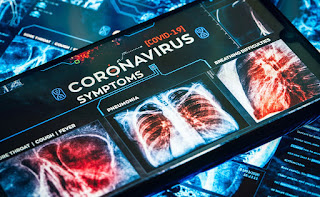Cough, fever and flu-like symptoms - these symptoms are often the guiding symptoms for a coronavirus infection. However in the course of the pandemic it has been shown that Sars-CoV-2 can attack a large number of organs and tissues in our body and cause a wide range of symptoms. Some patients suffer from headaches and neurological failures others develop a gradual lack of oxygen or develop abdominal pain and diarrhea. Non-specific muscle pain and exhaustion are common symptoms of Covid-19. In more severe cases, pneumonia and system-wide inflammatory reactions occur. The long-term effects of the infection have also hardly been researched. It is becoming apparent that a not inconsiderable number of patients still have symptoms weeks to months after the acute phase of the disease or even develop them only then.
Seven different symptom complexes
Bernhard Kratzer from the Medical University of Vienna and his colleagues have now investigated what is behind these processes immunologically and whether there is possibly a system for the very different symptoms of Covid-19.Although several studies have already examined the cellular immune responses of Covid-19 patients during their acute illness so far we know little about the long-term effects Covid-19 has on the adaptive and innate immune system of convalescents they explain. For their study they therefore analyzed the blood of 109 Covid-19 reconsvalescents whose infection with Sars-CoV-2 was around ten weeks ago. They determined which immune cells and antibodies were present in the blood samples and asked all participants in detail which symptoms had occurred during their acute Covid 19 disease. All convalescents had a rather mild course of Covid-19 at the time.
The evaluation of the symptom reports showed that with the mild course of Covid-19 there are apparently certain often combined symptom groups. We were able to clearly differentiate between systemic and organ-specific forms of the primary Covid-19 disease reports senior author Winfried Pickl from the Medical University of Vienna. From these combinations he and his team conclude that there are seven different forms of disease with a mild Covid-19 course. Knowledge of these disease variants could in the future help identify possible infections more quickly and possibly also treat them more specifically. The first form is characterized by the classic flu-like symptoms - fever exhaustion and cough. In its second variant the infection is more like a typical cold with runny nose sneezing dry throat and nasal congestion.
The third Covid-19 form on the other hand, manifests itself only or predominantly through joint and muscle pain a fourth through pronounced eye and mucosal inflammation as the scientists report. A fifth complex of symptoms are lung problems with pneumonia and shortness of breath. In the sixth form those affected primarily suffer from gastrointestinal problems with diarrhea nausea and headache. The seventh form of the disease is the loss of the sense of smell and taste. In the latter group we were able to determine that more people with a young immune system measured by the number of T lymphocytes that had recently emigrated from the thymus are affected by the loss of smell and taste explains Pickl.
Long-term immunological changes
Regardless of the variant of acute Covid 19 disease, there are many similarities in terms of the long-term immunological consequences. Accordingly Sars-CoV-2 leaves a kind of immunological fingerprint in the immune system and blood of the convalescents. The number of white blood cells which are otherwise responsible for fighting bacterial pathogens in the immune system is significantly lower than usual in Covid convalescents. There are more memory cells for this and the cytotoxic CD8 + T cells remain strongly activated. One of their tasks is to kill cells infected by viruses. At the same time the regulatory cells are greatly reduced - this is a dangerous mix that can also lead to autoimmunity e explains Pickl. Antibody-producing immune cells were also increasingly present in the convalescent's blood - the stronger the fever of the person affected the higher the antibody levels against the virus.
This shows that the immune system is still dealing intensively with the disease many weeks after the first infection says Pickl. The new findings help us to better understand Covid and its consequences. They also help us in the development of possible vaccines, since we can now fall back on promising biomarkers and carry out even better monitoring the scientists explain. Now it is a matter of implementing these findings and using them for the development of vaccines.




No comments:
Post a Comment